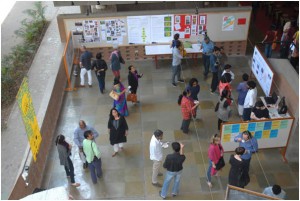11th April 2014 New Delhi, India
UNBOX-ing ‘Future Cities’
“Cities have the capability of providing something for everybody, only because, and only when, they are created by everybody” – Jane Jacobs
The Science and Innovation Network in India have been associated with the Unbox festival since 2012. The festival returned this year with its trademark celebration of interdisciplinary thought and work through a series of seminars, performances, exhibitions and talks from February 24 to March 7 at National Institute of Design (NID), Ahmedabad.
Like its previous avatar the festival brought together creative practitioners, artists and researchers from the UK and India together for a 10-day lab experience that explores the theme of “future cities”, with participants exploring ideas and developing responses to the challenges of our futures cities.

Following our successful UK-India Future Cities workshop, Mark and I were in Ahmedabad early this month to attend the Unbox Lab. During the 10-day lab, the group had worked together in small teams, along with local mentors and advisors, on-site at NID, Ahmedabad. The lab allowed for collaboration, prototyping, reflection, ideation and experimentation.
This unique fellowship opportunity is a partnership between the Arts and Humanities Research Council (AHRC), the British Council, UnBox Festival and the UK’s Science and Innovation Network.
The focus of the ‘lab’ is of major importance to many countries around the world, from 1991 to 2011; the urban population in India has increased from 100 million to 200 million. By 2041, 50 per cent of India’s population is expected to live in cities. The issue is a worldwide one. The United Nations estimates say that by 2050, 70 per cent of the world’s population will live in cities.
 The UK faces its own challenges of delivering effective and sustainable services within the context of rapid growth in urban centres, along with an explosion of personal digital technologies. While an increase in urban population puts increasing pressure on the infrastructure that makes them work, it can also be an opportunity to re-imagine what future cities can be like.
The UK faces its own challenges of delivering effective and sustainable services within the context of rapid growth in urban centres, along with an explosion of personal digital technologies. While an increase in urban population puts increasing pressure on the infrastructure that makes them work, it can also be an opportunity to re-imagine what future cities can be like.
It was stimulating to witness the project showcase of the researchers. These fellowships presented an exciting opportunity for open-minded creative-thinking researchers. The researchers received the experience of working within a non-academic environment and within a cross-cultural setting.
I have always been fascinated with the work of social scientists and researchers in the Arts and Humanities area. The metropolitan cities in India are juxtaposed to a point where it is next to impossible to alter it.
The researchers had a whole host of physical/digital offerings as speculative future scenarios, designs against crime, new policy and experiential installations that all evoke a new reading of our cities propelled into a future. There was a collective recognition of the importance of human relationships and that in future, how we build the frameworks and tools needed for people to make and sustain their own cities and communities is vital; the skills to enable citizens to be more resilient and the ability to adapt in a future full of unknowns.
These project ideas could ultimately be used towards applications for further funding from either AHRC or other partners (to be confirmed).
More information on the AHRC call for further funding will be forthcoming at a later date. Successful applicants will then be given the chance to showcase their work at the UnBox festival in India in October 2014.
For a taster of this year’s participant’s project summaries, watch some highlights on the UnBox Festival website. Watch this space for the outcomes of the Lab– get ready to be inspired!
Well researched and nice written by the author. Thanks for share this informative post. Keep it up
Best Animation Institute In Bangalore